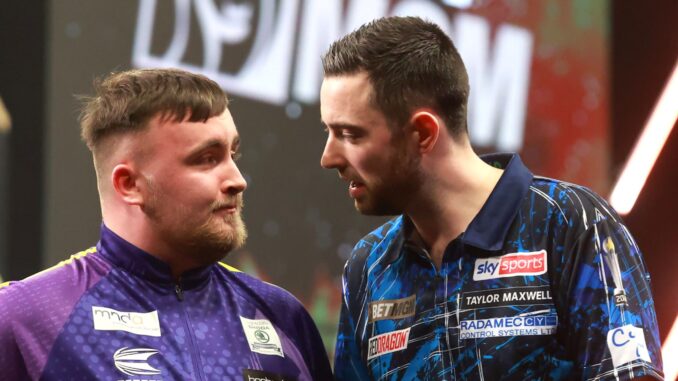
Luke Littler’s victory over Luke Humphries in the Glasgow final of the Premier League Darts was a dramatic affair, culminating in a thrilling deciding leg. However, the excitement of the match was overshadowed by a controversial element: the behavior of a section of the crowd. Littler, despite his triumph, expressed his disappointment with the whistling that disrupted the flow of the game, particularly when Humphries was at the oche.1
The atmosphere at the OVO Hydro was electric, as expected for a high-stakes darts final. However, amidst the cheers and chants, a noticeable contingent of spectators resorted to whistling, a tactic often used to distract and unsettle players.2 While crowd participation is a vital part of the darts experience, there’s a fine line between enthusiastic support and unsportmanlike conduct. In this instance, some felt that the line was crossed.
Littler, in his post-match comments, didn’t shy away from addressing the issue. He acknowledged that while some level of noise is expected, the whistling went too far, specifically targeting Humphries during his throws. He noted that even after the referee, Kirk Bevins, intervened and asked the crowd to quiet down, the whistling intensified.3 This, he felt, ironically put him in an uncomfortable position, as the disruption seemed to escalate after the referee’s intervention.
The young darts sensation even humorously recounted a moment where the whistling directly impacted the match. He revealed that after the referee’s warning, he missed doubles, allowing Humphries to break his throw and take a 5-4 lead.4 Littler quipped that he felt the referee’s intervention had backfired, putting him in a difficult situation. However, he quickly regained his composure, broke back, and ultimately secured the win with a strong finish.5
This incident has sparked a debate about the role of the crowd in darts and the acceptable limits of fan behavior. While passionate support is encouraged, many argue that whistling crosses the line into unsportmanlike conduct, potentially affecting the players’ performance and detracting from the overall experience. It raises questions about whether stricter measures should be taken to prevent such behavior in the future.
The controversy also highlights the pressure that players face in high-stakes matches. Not only do they have to contend with the skill and strategy of their opponents, but they also have to manage the distractions and pressures that come from a boisterous crowd. While some players thrive in such an environment, others can find it unsettling, impacting their focus and concentration.
Littler’s comments have resonated with many in the darts community, with fellow players and commentators echoing his concerns about the behavior of some spectators. There’s a growing consensus that while lively support is welcome, it’s crucial to maintain a respectful atmosphere where players can perform at their best.
The Glasgow final served as a reminder of the delicate balance between fostering an energetic atmosphere and ensuring fair play. While the crowd’s passion is part of what makes darts such an exciting sport, it’s essential to ensure that enthusiasm doesn’t turn into unsportmanlike behavior that could negatively impact the players and the integrity of the competition.
Looking ahead, it’s likely that discussions will continue about how to address this issue and create a more consistently positive environment for both players and fans. Whether this involves stricter refereeing, clearer guidelines for spectator conduct, or a greater emphasis on sportsmanship, the goal is to ensure that the focus remains on the incredible skill and drama unfolding on the oche.
For Luke Littler, this victory in Glasgow was a significant milestone, but it was also a match that highlighted the challenges that come with being a professional darts player. As he continues his rise in the sport, he’ll undoubtedly face similar situations, and his ability to handle these pressures, both on and off the oche, will be crucial to his continued success.
Leave a Reply